1
People cited violation of the First Amendment when a New Jersey schoolteacher asserted that evolution and the Big Bang are not scientific and that Noah's ark carried dinosaurs. This case is not about the need to separate church and state; it's about the need to separate ignorant, scientifically illiterate people from the ranks of teachers.Neil Degrasse Tyson
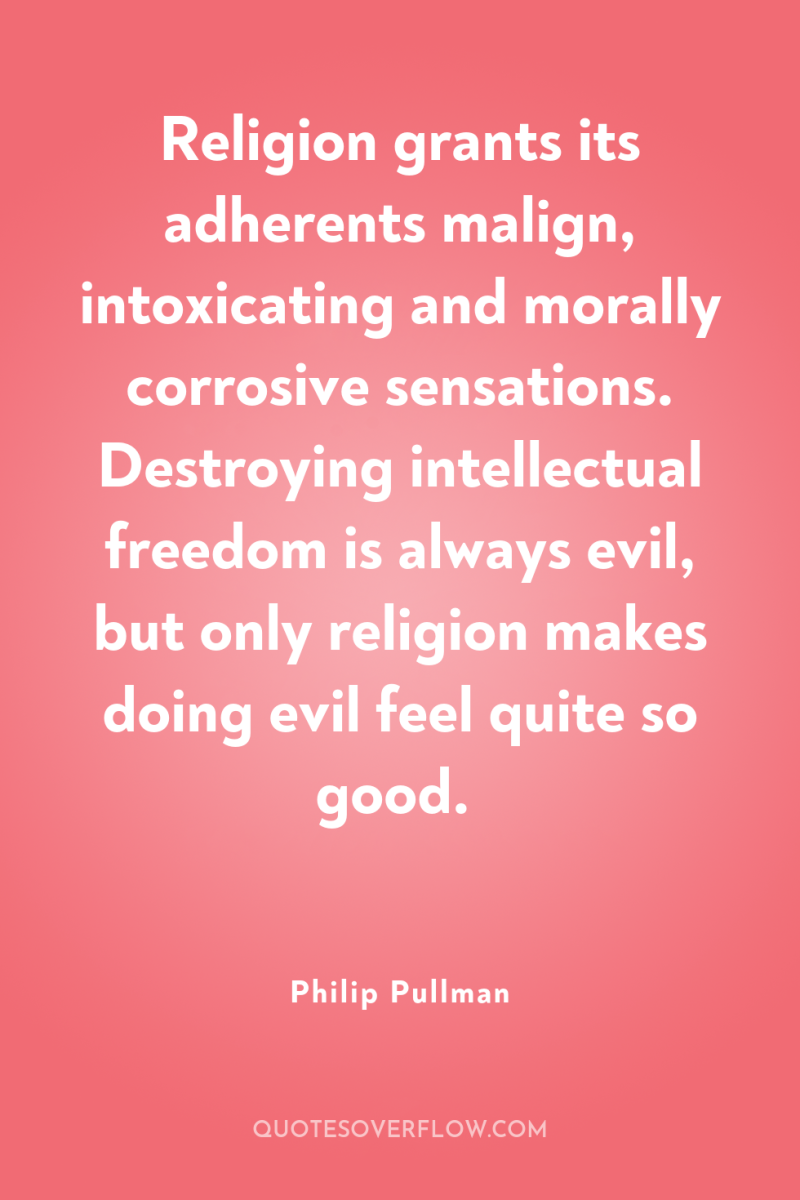
2
Religion grants its adherents malign, intoxicating and morally corrosive sensations. Destroying intellectual freedom is always evil, but only religion makes doing evil feel quite so good.Philip Pullman
3
The science of government it is my duty to study, more than all other sciences; the arts of legislation and administration and negotiation ought to take the place of, indeed exclude, in a manner, all other arts. I must study politics and war, that our sons may have liberty to study mathematics and philosophy. Our sons ought to study mathematics and philosophy, geography, natural history and naval architecture, navigation, commerce and agriculture in order to give their children a right to study painting, poetry, music, architecture, statuary, tapestry and porcelain.John Adams
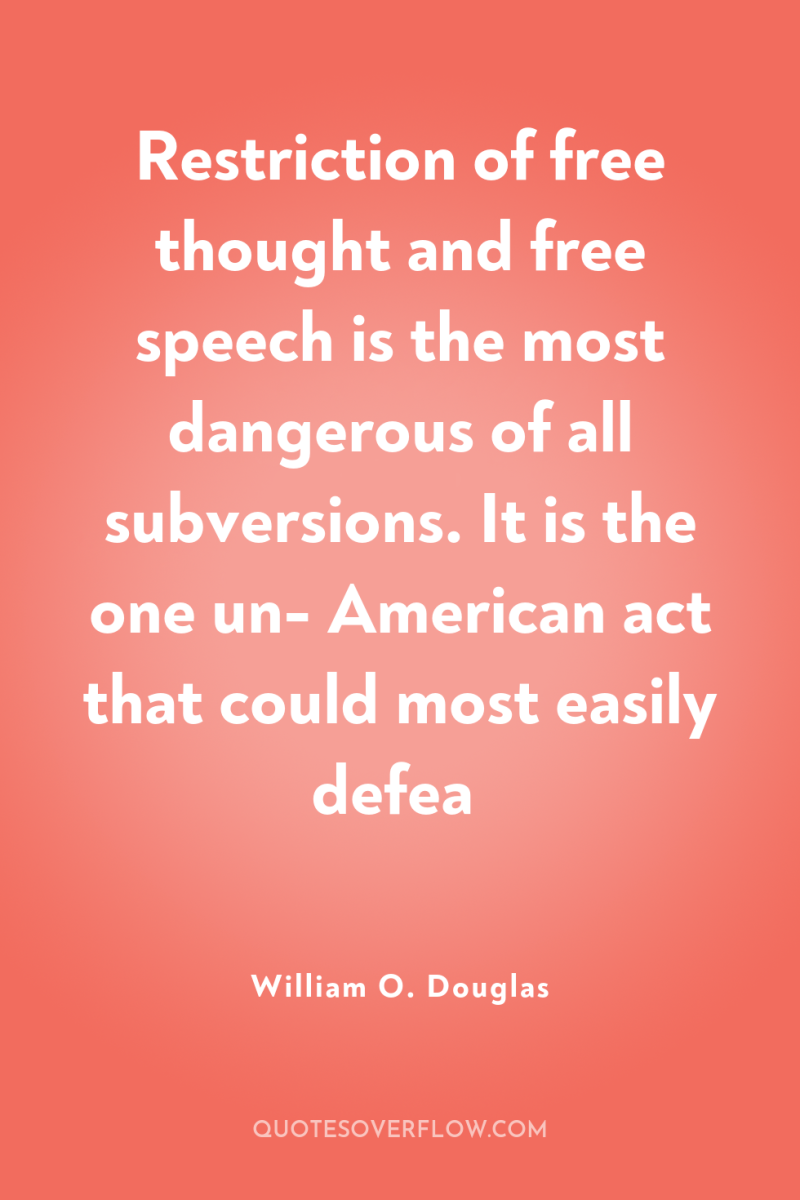
4
Restriction of free thought and free speech is the most dangerous of all subversions. It is the one un- American act that could most easily defeaWilliam O. Douglas
5
Struggles to coerce uniformity of sentiment in support of some end thought essential to their time and country have been waged by many good as well as by evil men. Nationalism is a relatively recent phenomenon but at other times and places the ends have been racial or territorial security, support of a dynasty or regime, and particular plans for saving souls. As first and moderate methods to attain unity have failed, those bent on its accomplishment must resort to an ever-increasing severity. Those who begin coercive elimination of dissent soon find themselves exterminating dissenters. Compulsory unification of opinion achieves only the unanimity of the graveyard. It seems trite but necessary to say that the First Amendment to our Constitution was designed to avoid these ends by avoiding these beginnings. There is no mysticism in the American concept of the State or of the nature or origin of its authority. We set up government by consent of the governed, and the Bill of Rights denies those in power any legal opportunity to coerce that consent. Authority here is to be controlled by public opinion, not public opinion by authority. If there is any fixed star in our constitutional constellation, it is that no official, high or petty, can prescribe what shall be orthodox in politics, nationalism, religion, or other matters of opinion or force citizens to confess by word or act their faith therein.Robert H. Jackson
6
Our democracy depends on an informed citizenry to survive, Your Honor. Besides the advancement of truth, science and morality in general, the freedom of the press is a backbone of democracy. It exists to keep the government transparent, and the human instruments of government honest.Kenneth Eade
7
A funny thing happened to the First Amendment on its way to the public forum. According to the Supreme Court, money is now speech and corporations are now people. But when real people without money assemble to express their dissatisfaction with the political consequences of this, they’re treated as public nuisances and evicted.Robert B. Reich
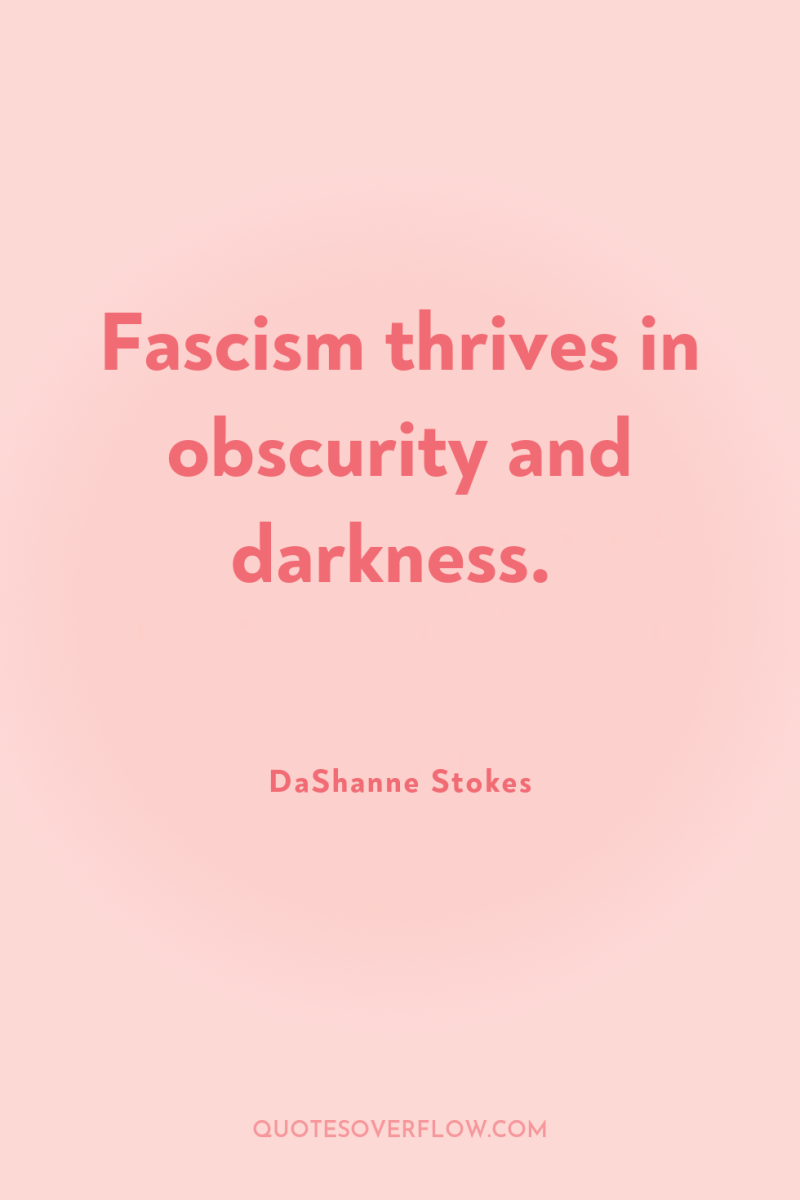
8
Fascism thrives in obscurity and darkness.DaShanne Stokes
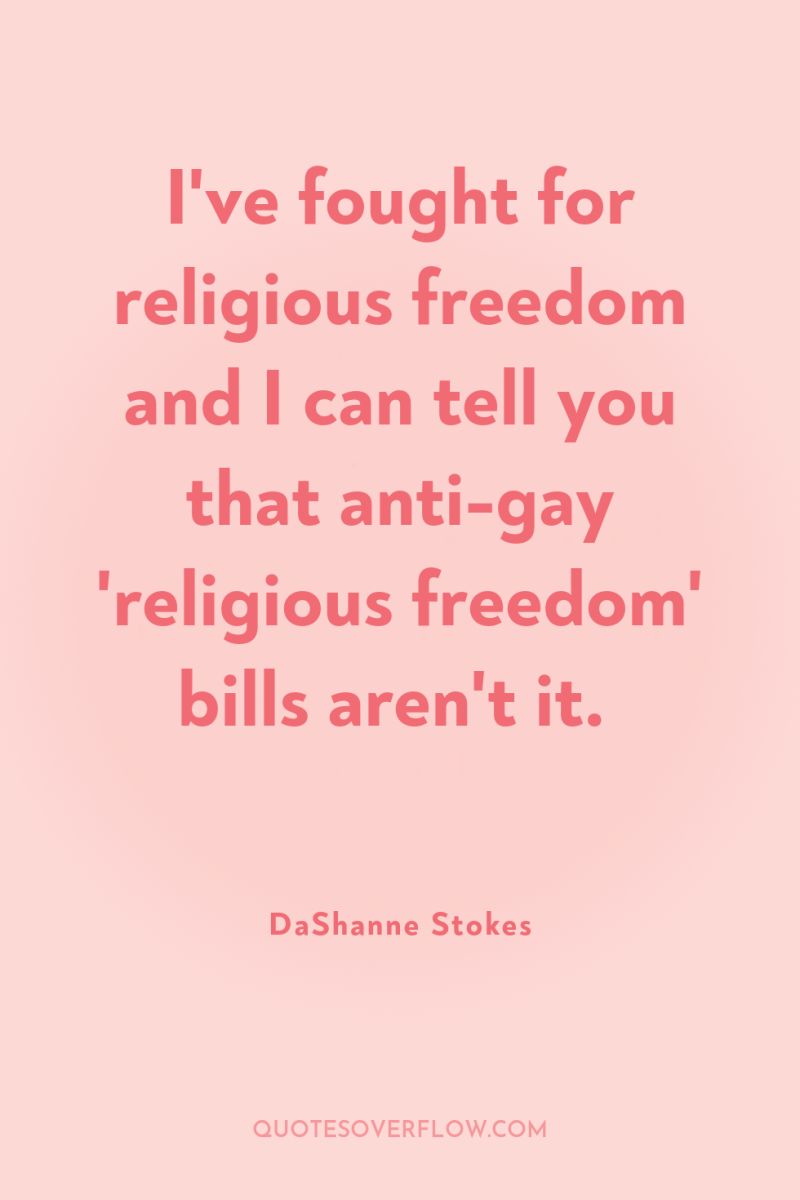
9
I've fought for religious freedom and I can tell you that anti-gay 'religious freedom' bills aren't it.DaShanne Stokes
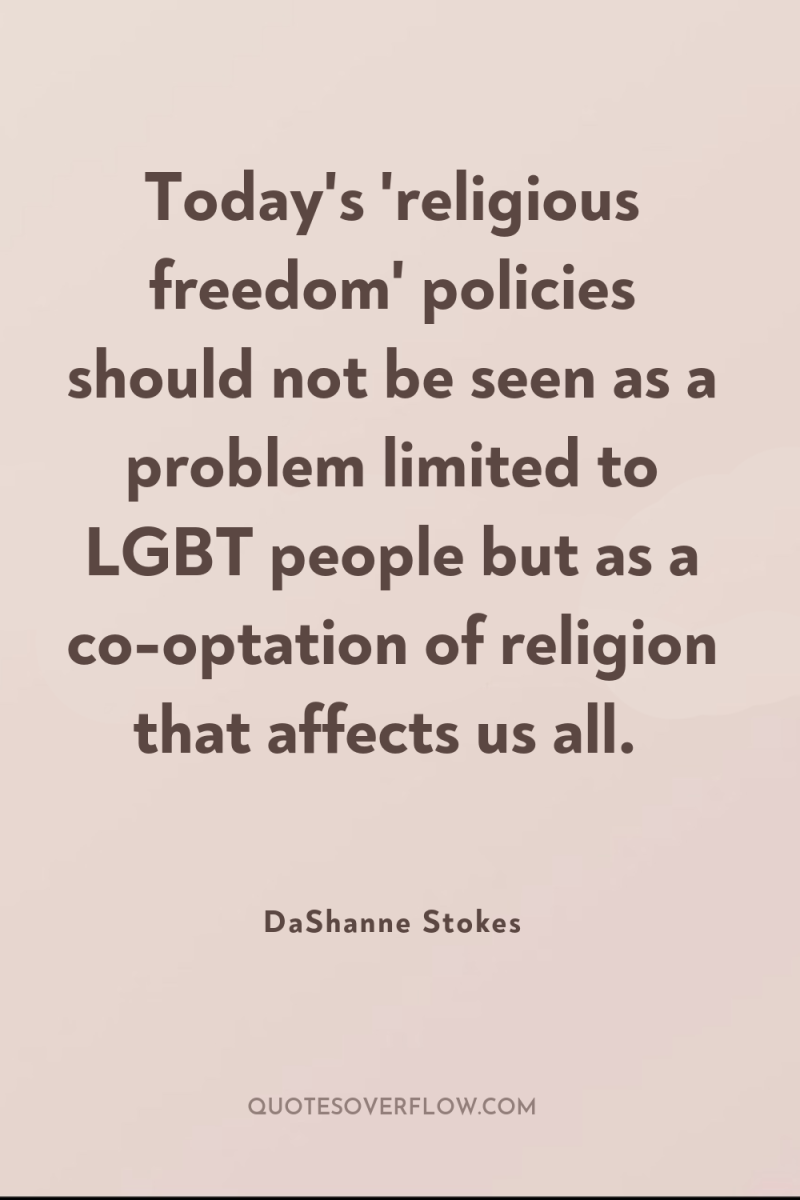
10
Today's 'religious freedom' policies should not be seen as a problem limited to LGBT people but as a co-optation of religion that affects us all.DaShanne Stokes
11
If you defend free speech for bigots but not to combat bigotry, then you believe in bigotry, not free speech.DaShanne Stokes
12
What does religious freedom mean if we would use it as a cover for hate and privilege?DaShanne Stokes
13
From time to time our national history has been marred by forgetfulness of the Jeffersonian principle that restraint is at the heart of liberty. In 1789 the Federalists adopted Alien and Sedition Acts in a shabby political effort to isolate the Republic from the world and to punish political criticism as seditious libel. In 1865 the Radical Republicans sought to snare private conscience in a web of oaths and affirmations of loyalty. Spokesmen for the South did service for the Nation in resisting the petty tyranny of distrustful vengeance. In the 1920's the Attorney General of the United States degraded his office by hunting political radicals as if they were Salem witches. The Nation's only gain from his efforts were the classic dissents of Holmes and Brandeis.In our own times, the old blunt instruments have again been put to work. The States have followed in the footsteps of the Federalists and have put Alien and Sedition Acts upon their statute books. An epidemic of loyalty oaths has spread across the Nation until no town or village seems to feel secure until its servants have purged themselves of all suspicion of non-conformity by swearing to their political cleanliness. Those who love the twilight speak as if public education must be training in conformity, and government support of science be public aid of caution. We have also seen a sharpening and refinement of abusive power. The legislative investigation, designed and often exercised for the achievement of high ends, has too frequently been used by the Nation and the States as a means for effecting the disgrace and degradation of private persons. Unscrupulous demagogues have used the power to investigate as tyrants of an earlier day used the bill of attainder. The architects of fear have converted a wholesome law against conspiracy into an instrument for making association a crime. Pretending to fear government they have asked government to outlaw private protest. They glorify "togetherness" when it is theirs, and call it conspiracy when it is that of others. In listing these abuses I do not mean to condemn our central effort to protect the Nation's security. The dangers that surround us have been very great, and many of our measures of vigilance have ample justification. Yet there are few among us who do not share a portion of the blame for not recognizing soon enough the dark tendency towards excess of caution.John F. Kennedy
14
Government in our democracy, state and national, must be neutral in matters of religious theory, doctrine, and practice. It may not be hostile to any religion or to the advocacy of no-religion; and it may not aid, foster, or promote one religion or religious theory against another or even against the militant opposite. The First Amendment mandates governmental neutrality between religion and religion, and between religion and nonreligion.[ Epperson v. Arkansas, 393 U.S. 97, 1968.] .Abe Fortas
15
Once the government can demand of a publisher the names of the purchasers of his publications, the free press as we know it disappears. Then the spectre of a government agent will look over the shoulder of everyone who reads. The purchase of a book or pamphlet today may result in a subpoena tomorrow. Fear of criticism goes with every person into the bookstall. The subtle, imponderable pressures of the orthodox lay hold. Some will fear to read what is unpopular, what the powers-that-be dislike. When the light of publicity may reach any student, any teacher, inquiry will be discouraged. The books and pamphlets that are critical of the administration, that preach an unpopular policy in domestic or foreign affairs, that are in disrepute in the orthodox school of thought will be suspect and subject to investigation. The press and its readers will pay a heavy price in harassment. But that will be minor in comparison with the menace of the shadow which government will cast over literature that does not follow the dominant party line. If the lady from Toledo can be required to disclose what she read yesterday and what she will read tomorrow, fear will take the place of freedom in the libraries, book stores, and homes of the land. Through the harassment of hearings, investigations, reports, and subpoenas government will hold a club over speech and over the p .William O. Douglas
16
Creationists have also changed their name ... to intelligent design theorists who study 'irreducible complexity' and the 'abrupt appearance' of life–yet more jargon for 'God did it.' ... Notice that they have no interest in replacing evolution with native American creation myths or including the Code of Hammurabi alongside the posting of the Ten Commandments in public schools.Michael Shermer
17
Religion should be subject to commonsense appraisal and rational review, as openly discussible as, say, politics, art and the weather. The First Amendment, we should recall, forbids Congress both from establishing laws designating a state religion and from abridging freedom of speech. There is no reason why we should shy away from speaking freely about religion, no reason why it should be thought impolite to debate it, especially when, as so often happens, religious folk bring it up on their own and try to impose it on others.Jeffrey Tayler
18
[T]here is both an intrinsic and instrumental value to privacy. Intrinsically, privacy is precious to the extent that it is a component of a liberty. Part of citizenship in a free society is the expectation that one's personal affairs and physical person are inviolable so long as one remains within the law. A robust concept of freedom includes the freedom from constant and intrusive government surveillance of one's life. From this perspective, Fourth Amendment violations are objectionable for the simple fact that the government is doing something it has no licence to do—that is, invading the privacy of a law-abiding citizen by monitoring her daily activities and laying hands on her person without any evidence of wrongdoing. Privacy is also instrumental in nature. This aspect of the right highlights the pernicious effects, rather than the inherent illegitimacy, of intrusive, suspicionless surveillance. For example, encroachments on individual privacy undermine democratic institutions by chilling free speech. When citizens—especially those espousing unpopular viewpoints—are aware that the intimate details of their personal lives are pervasively monitored by government, or even that they could be singled out for discriminatory treatment by government officials as a result of their First Amendment expressive activities, they are less likely to freely express their dissident views.John W. Whitehead
19
The United States has experienced more than two centuries of political stability. When viewed against the background of world history, this is remarkable. The First Amendment has played a singularly important role. When citizens can openly criticize their government, changes come about through orderly political processes. When grievances exist, they must be aired, if not through the channels of public debate, then by riots in the streets. The First Amendment functions as a safety valve through which the pressures and frustrations of a heterogeneous society can be ventilated and defused.Jacqueline R. Kanovitz
20
You can make a successful run for political office in this country without an especially thick r̩sum̩, any exceptional talent for expressing yourself, a noteworthy education or, for that matter, a basic grasp of science. But you better have religion. You better be ready to profess your faith in and fealty to God Рthe Judeo-Christian one, of course. And you better be convincing. A dust-up last week in the 2014 race for a United States Senate seat from Arkansas provided a sad reminder of this, showing once again that our ballyhooed separation of church and state is less canyon than itty-bitty crack.Frank Bruni
21
The Fourth Amendment wasn't written for people with nothing to hide any more than the First Amendment was written for people with nothing to say.Dave Krueger
22
I was astonished, bewildered. This was America, a country where, whatever its faults, people could speak, write, assemble, demonstrate without fear. It was in the Constitution, the Bill of Rights. We were a democracy.. But I knew it wasn't a dream; there was a painful lump on the side of my head.. The state and its police were not neutral referees in a society of contending interests. They were on the side of the rich and powerful. Free speech? Try it and the police will be there with their horses, their clubs, their guns, to stop you. From that moment on, I was no longer a liberal, a believer in the self-correcting character of American democracy. I was a radical, believing that something fundamental was wrong in this country--not just the existence of poverty amidst great wealth, not just the horrible treatment of black people, but something rotten at the root. The situation required not just a new president or new laws, but an uprooting of the old order, the introduction of a new kind of society--cooperative, peaceful, egalitarian.Howard Zinn
23
Believing this country to be a political and not a religious organisation ... the editor of the NATIONAL CITIZEN will use all her influence of voice and pen against 'Sabbath Laws', the uses of the 'Bible in School', and pre-eminently against an amendment which shall introduce 'God in the Constitution.Matilda Joslyn Gage
24
When we hide discrimination under the guise of 'religious freedom, ' we make a mockery of human rights.DaShanne Stokes
25
Regulated" rights are not rights. They are niceties and platitudes intended to keep the populace thinking their individual autonomy is respected by their government.A.E. Samaan
26
It is the press, above all, which wages a positively fanatical and slanderous struggle, tearing down everything which can be regarded as a support of national independence, cultural elevation, and the economic independence of the nation.Adolf Hitler